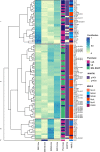Mutational signature profiling classifies subtypes of clinically different mismatch-repair-deficient tumours with a differential immunogenic response potential
- PMID: 35197584
- PMCID: PMC9130322
- DOI: 10.1038/s41416-022-01754-1
Mutational signature profiling classifies subtypes of clinically different mismatch-repair-deficient tumours with a differential immunogenic response potential
Abstract
Background: Mismatch repair (MMR) deficiency is the hallmark of tumours from Lynch syndrome (LS), sporadic MLH1 hypermethylated and Lynch-like syndrome (LLS), but there is a lack of understanding of the variability in their mutational profiles based on clinical phenotypes. The aim of this study was to perform a molecular characterisation to identify novel features that can impact tumour behaviour and clinical management.
Methods: We tested 105 MMR-deficient colorectal cancer tumours (25 LS, 35 LLS and 45 sporadic) for global exome microsatellite instability, cancer mutational signatures, mutational spectrum and neoepitope load.
Results: Fifty-three percent of tumours showed high contribution of MMR-deficient mutational signatures, high level of global exome microsatellite instability, loss of MLH1/PMS2 protein expression and included sporadic tumours. Thirty-one percent of tumours showed weaker features of MMR deficiency, 62% lost MSH2/MSH6 expression and included 60% of LS and 44% of LLS tumours. Remarkably, 9% of all tumours lacked global exome microsatellite instability. Lastly, HLA-B07:02 could be triggering the neoantigen presentation in tumours that show the strongest contribution of MMR-deficient tumours.
Conclusions: Next-generation sequencing approaches allow for a granular molecular characterisation of MMR-deficient tumours, which can be essential to properly diagnose and treat patients with these tumours in the setting of personalised medicine.
© 2022. The Author(s), under exclusive licence to Springer Nature Limited.
Conflict of interest statement
SS is a consultant for Myriad Genetics and DC Health Technologies and has rights to an inventor portion of the licensing revenue from PREMM5. The remaining authors declare no competing interests.
Figures


References
-
- Kane MF, Loda M, Gaida GM, Lipman J, Mishra R, Goldman H, et al. Methylation of the hMLH1 promoter correlates with lack of expression of hMLH1 in sporadic colon tumors and mismatch repair-defective human tumor cell lines. Cancer Res. 1997;57:808–11. - PubMed
Publication types
MeSH terms
Substances
Supplementary concepts
Grants and funding
LinkOut - more resources
Full Text Sources
Research Materials
Miscellaneous

